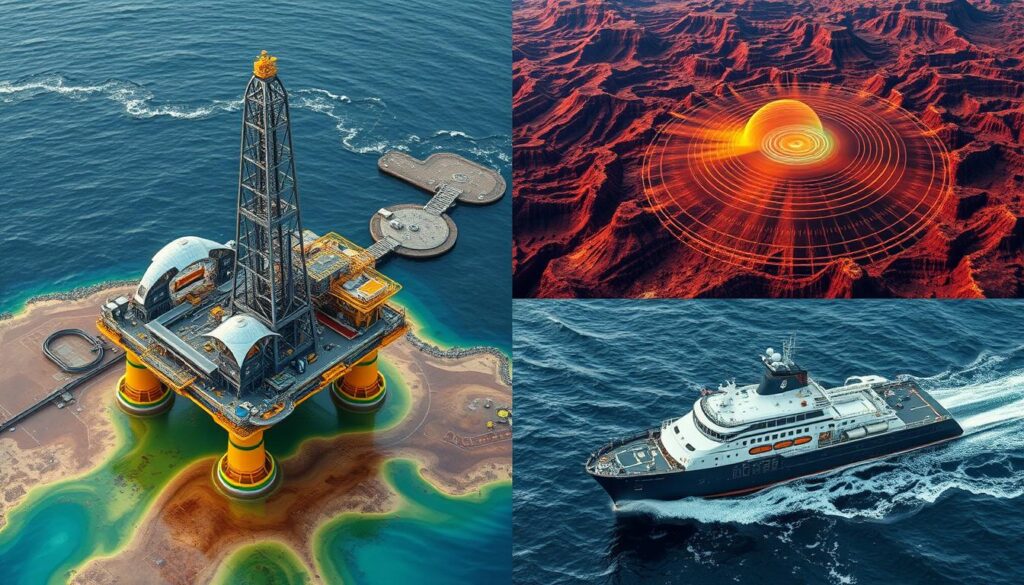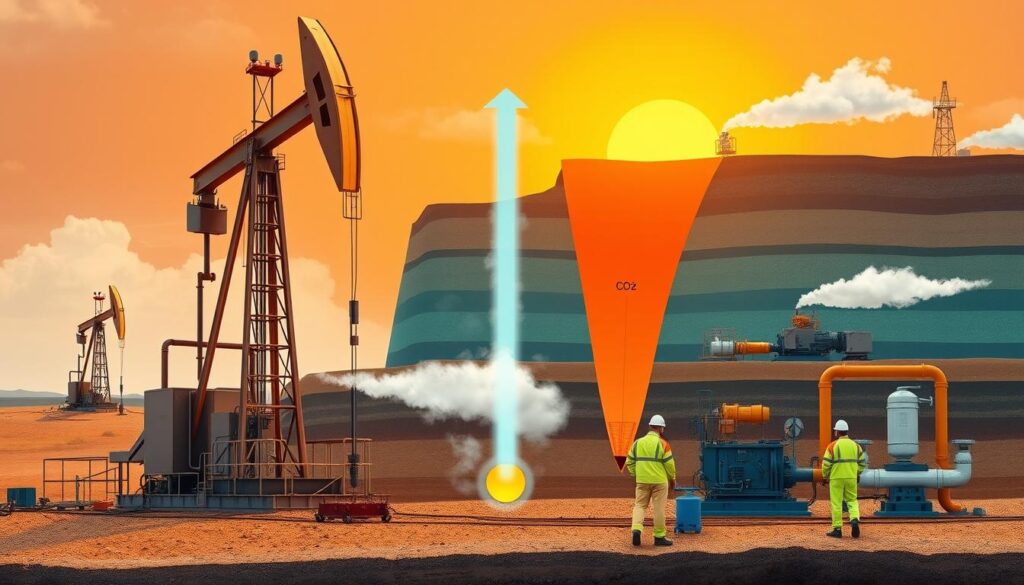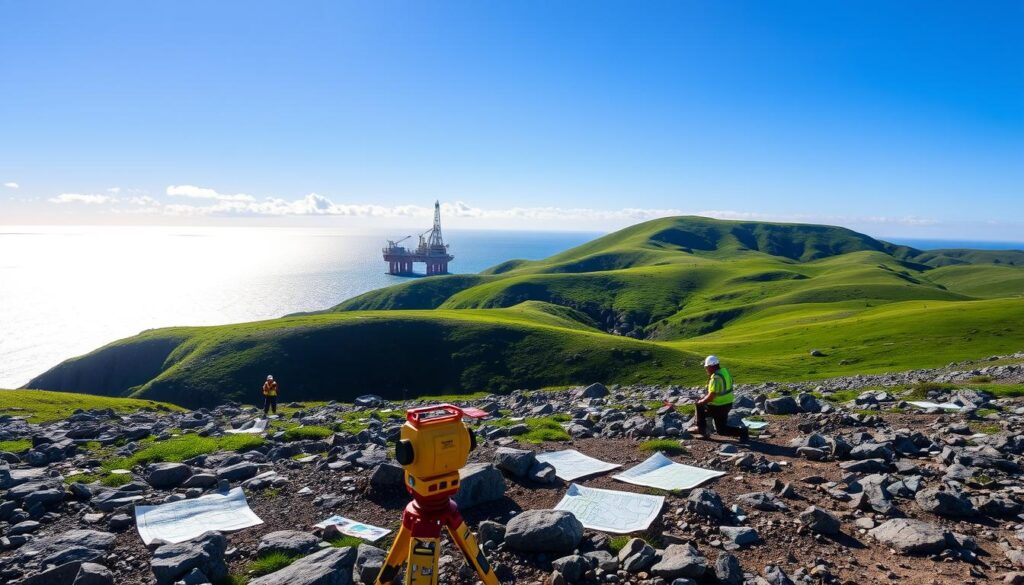Ever thought about how our world gets its energy? Petroleum engineering is key to finding and getting that energy out. It changes how we use Earth’s hidden energy.
Petroleum engineers are important for getting oil and gas from deep down. They use science and new tech. This job is growing fast, with good pay and exciting work.
This job is more than just drilling. It needs a lot of math, physics, and geology. Students learn about fluids, rocks, and special software.
Petroleum engineers do a lot of work. They use tech and think about the planet. They help make sure we have energy but also protect the environment.
Key Takeaways
- Petroleum engineering combines advanced sciences and technology
- Median annual salary exceeds $137,000
- Projected job growth of 8% indicates strong industry demand
- Requires interdisciplinary skills in mathematics, physics, and geology
- Offers opportunities for global career development
What is Petroleum Engineering
Petroleum engineering is a key field in the oil and gas industry. It focuses on getting valuable oil and gas from under the Earth. This is done with new technologies and science.
The first degree in petroleum engineering was given in 1915 by the University of Pittsburgh. This started a vital job that helps make energy worldwide. Today, petroleum engineers help find ways to get more oil and gas. They also think about money and the environment.
Core Disciplines in Petroleum Engineering
Petroleum engineering has three main areas. They work together to get more energy:
- Reservoir Engineering: Studies underground rocks and fluids
- Drilling Engineering: Creates ways to dig wells
- Production Engineering: Deals with getting oil and gas out
The Role of Modern Technology
New tech like the Electromagnetic Propagation Tool (EPT) has changed how we find oil and gas. EPT helps tell oil from water. This makes getting oil and gas better and more efficient.
Career Opportunities and Industry Demand
Petroleum engineering has great job chances. In 2020, the average salary was US$137,330. Those with more experience can make US$170,000 to US$260,000 a year. Jobs are expected to grow 3% from 2019 to 2029.
Starting in petroleum engineering can lead to many jobs. You could work in the field, do research, or manage in the oil and gas industry.
Advanced Exploration Techniques in Oil and Gas

Modern petroleum engineering has changed how we find and get energy. Well logging is key to knowing what’s underground and finding oil and gas. It’s how we find the hidden treasures deep in the Earth.
Reflection seismology is a top tech in finding oil and gas. It sends sound waves into the ground and looks at the echoes. These echoes tell us a lot about the underground structures that might have oil or gas.
| Exploration Technique | Primary Purpose | Success Rate |
|---|---|---|
| Seismic Prospecting | Identifying Possible Reservoirs | Reduces Exploration Risk by 40% |
| Well Logging | Analyzing Underground Formations | 90% Accuracy in Reservoir Characterization |
| Core Sampling | Detailed Petrophysical Analysis | Over 90% Insight into Reservoir Quality |
Petroleum engineering schools are training the next explorers. Students learn new methods like drone checks, robots, and data analysis. These new ways help find more oil and gas safely.
The future of finding energy is in new tech. We’re using 3D seismic and robots to dig. These tools help us find and get Earth’s hidden energy better.
Enhanced Oil Recovery: Revolutionizing Production
Petroleum engineering is changing fast with new ways to get oil from old wells. These new methods are making it possible to get more oil from wells that seemed empty before.

The world is seeing big changes in how we get oil with new EOR methods. Now, we can get 5-15% more oil than before. This means every bit of oil is important.
Waterflooding: Reviving Dormant Wells
Waterflooding is a key way to get more oil. It works by using water to push oil towards wells. It’s like getting every last drop of juice from an orange.
| EOR Technique | Recovery Rate Improvement | Primary Application |
|---|---|---|
| Waterflooding | 5-15% | Conventional Reservoirs |
| Thermal Recovery | 50%+ | Heavy Oil Reservoirs |
| Gas Injection (CO2) | Up to 30% | Carbon Sequestration |
Smart Water Technology: Precision Engineering
Smart water technology is at the forefront of oil engineering. It uses special water to get more oil from rocks. This method uses deep knowledge of how rocks work.
Chemical Enhancement Methods
Chemical EOR is changing oil getting by using special chemicals. These chemicals help oil come out of rocks. This can get 10-20% more oil, making old wells useful again.
The future of oil getting is bright with new tech and smart chemicals. We’ll get more oil and hurt the environment less.
Health, Safety, and Environmental Considerations
As a petroleum engineer, you do more than just extract resources. Keeping health, safety, and the environment in mind is key. The 2010 Deepwater Horizon oil spill showed how important strong safety rules are. It spilled over 130 million gallons of oil into the Gulf of Mexico.
Petroleum engineers use new ways to lower environmental risks. Digital tools help stop accidents by watching over complex systems. They also use “smart pig” technology for remote checks on pipelines. This finds problems like corrosion before they get worse.
Safety in petroleum engineering covers many areas:
- General workplace safety protocols
- Chemical hazard management
- Emergency response procedures
- Incident reporting mechanisms
Today’s petroleum engineers focus on being green. They work to cut down on greenhouse gas emissions. They learn about safety and taking care of the environment through training.
Your work in health, safety, and the environment protects people and nature. It also makes sure energy is produced in a responsible way. Petroleum engineers are making the industry better by always learning and using new tech.
Conclusion
Exploring petroleum engineering shows us a field that’s both dynamic and vital. It’s key to solving global energy needs. The industry is expected to grow by 8% from 2020 to 2030.
This field combines tech, money, and caring for the planet. It’s where new tech meets old needs.
The industry uses new tech in amazing ways. About 80% of petroleum engineers use special software to guess how oil will behave. And 65% use AI to tackle tough problems.
This shows how the field has changed. It’s moved from simple digging to smart, high-tech ways of managing resources.
Looking to the future, petroleum engineering offers great chances. Salaries can be as high as $137,720, and starting jobs are around $87,853. It’s a career with big money and big impact.
But it’s not just about money. The industry is also focusing on being green. About 62% of engineers say they now think about the environment when planning projects.
Now, you see petroleum engineering as more than just digging for oil. It’s a complex field that mixes tech, money, and caring for our planet. The future of oil and gas depends on people who can handle these big challenges.



